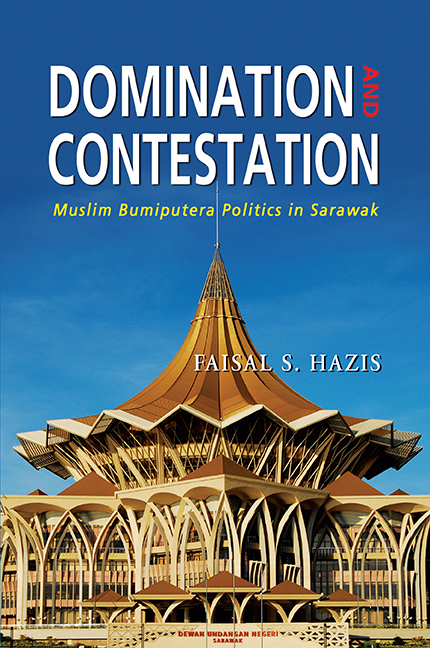Book contents
- Frontmatter
- Contents
- List of Tables
- List of Figures
- Preface
- List of Abbreviations
- 1 Introduction
- 2 State and Social Forces in Sarawak
- 3 The Resurgence of Muslim Bumiputera Politics, 1970–81
- 4 Years of Turbulence, 1981–87
- 5 Consolidation and Domination of the Muslim Bumiputera, 1987–2003
- 6 Muslim Bumiputera Politics in the Post-Mahathir Era, 2003–06
- 7 The Coastal Malays of Southwest Sarawak: A Case Study of the Muslim Bumiputera's Political Domination
- 8 Conclusion
- Postscript
- Appendices
- Bibliography
- Index
- About the Author
- Frontmatter
- Contents
- List of Tables
- List of Figures
- Preface
- List of Abbreviations
- 1 Introduction
- 2 State and Social Forces in Sarawak
- 3 The Resurgence of Muslim Bumiputera Politics, 1970–81
- 4 Years of Turbulence, 1981–87
- 5 Consolidation and Domination of the Muslim Bumiputera, 1987–2003
- 6 Muslim Bumiputera Politics in the Post-Mahathir Era, 2003–06
- 7 The Coastal Malays of Southwest Sarawak: A Case Study of the Muslim Bumiputera's Political Domination
- 8 Conclusion
- Postscript
- Appendices
- Bibliography
- Index
- About the Author
Summary
Something shocking was brewing when the 2008 election results were not forthcoming on the tube that night. Except for a string of positive results for BN courtesy of its component parties from Sarawak and Sabah, there was an unusual delay in the announcement of the rest of the results which would normally become public knowledge by 10 p.m. Puzzled and intrigued with the unusual turn of events, many Malaysians turned to the Internet to look for answers. The results posted on the popular and widely read news portal, Malaysiakini, sent shockwaves throughout the country. Several BN's leaders were facing defeat while the opposition had secured a significant number of parliamentary and negeri seats throughout the Peninsula. By 3 a.m., the opposition remarkably formed governments in five negeris (Kelantan, Penang, Kedah, Selangor and Perak) and historically denied the ruling party a two-third majority in Parliament. Initially, there was a sense of fear that the ruling party would try to overturn the results or even declare a state of emergency in order to nullify Malaysia's twelfth general elections. However, the air of trepidation was subsequently cleared when the ruling party graciously accepted its worst performance since the 1970 election in the wee hours of 9 March.
The failure of the ruling party to defend its two-third majority in Parliament and its defeat in five negeris was liken by many political analysts as a tsunami that brought catastrophic effect on the formidable party. Prior to the March 8 election, everyone including the opposition expected BN to maintain its dominance albeit with a reduced parliamentary seats and popular vote. Many analysts doubted the opposition's capabilities to pose a serious challenge towards BN mainly because of the ruling party's ability to exploit the state's resources and the mass media to win elections. This assumption was severely contested in the March 8 election. The people power was too strong that even the practice of vote buying, the manipulation of the electoral process, the ruling party's control over the mainstream media, the exploitation of racial sentiments and the politicization of development could no longer ensure the ruling party's dominance in the elections.
In Sarawak, the political tsunami that erupted in the Peninsula did not reach the shore of this negeri.
- Type
- Chapter
- Information
- Domination and ContestationMuslim Bumiputera Politics in Sarawak, pp. 275 - 282Publisher: ISEAS–Yusof Ishak InstitutePrint publication year: 2011

